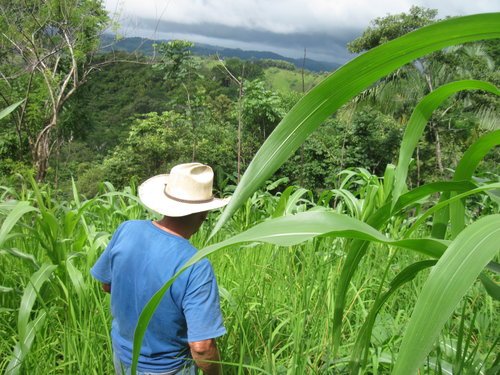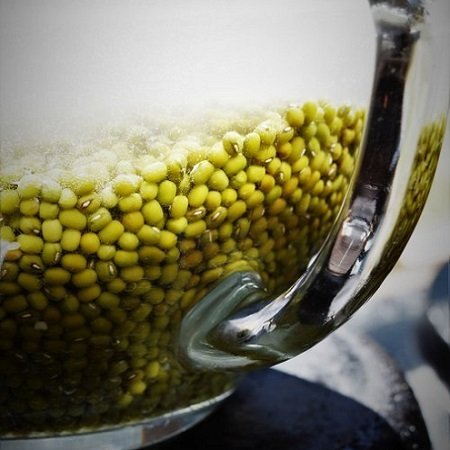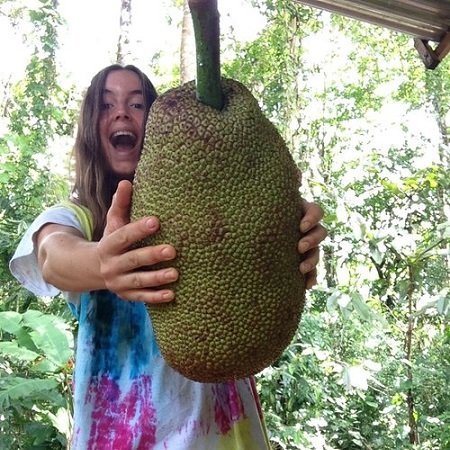
Farm to Table Tales
Good food takes time. I’ve heard this phrase many times before, but after nine months at the Ranch, I’ve truly come to understand what it means to me. The local Costa Ricans are called the Ticos. The Ticos live by the mantra “Pura Vida”, which directly translates to pure life.
This is indefinitely how they choose to live. “Tico time” is another phrase I’ve heard and come to understand here. Ticos work at their own pace, never feeling the need to hurry or stress at time. They are the happiest people I’ve ever met. The western way of life has much to learn from this, no more so than in the world of food. I have three stories to tell that I think shed perfect light on this matter.
Beans
One day back in April myself and my fellow apprentices were asked by one of the local farmers and Mastatal old timer, Chepo, to help him with his black bean harvest. We were so excited by the opportunity to see and learn how black beans get from the soil to our plates, given the fact that we eat them with almost every meal. We started with a trek from the road through the jungle to the black bean field.

Here, Chepo was harvesting stems of beans that had been cut a week prior and left to dry on the ground. It was a blistering hot day, typical of the dry season and the sun was beating down on the exposed field. We jumped in and helped him collect the many hundreds of black bean vines from the undulating ground. We took them to the side of the field and mounded them up beside the bean bashing station, a big blue tarp strung between four bamboo poles.
When the beans were all collected we started piling them onto the blue tarp, then Chepo stood at one end with two heavy wooden poles in both his hands. He started bashing the mounds of dried bean vines to release the beans from their pods. We rotated around, all getting in to have a go. The poles were much heavier than I’d expected and after about five minutes my shoulders started to burn and my sweaty palms started to blister.

Once one pile was done we tossed the bean vines to the side, bagged the loose beans on the tarp then loaded up another mound. It took our group of eight almost two hours to release and bag all of the beans.
`
Once the bags were tied up we each grabbed one, slung it over our shoulders and started our slippery, steep 30 minute hike to the road, each one of us slipping under the weight of the bags and the tough terrain. But this didn’t phase us, we all still had big smiles on our faces feeling accomplished and grateful for having this experience.
We also all recognized that if we hadn’t been there to help Chepo, he would have been doing all this work alone, as I’m sure he and fellow farmers have done many times before.
I will never eat beans the same way again. I have a new appreciation for this humble staple food. When I worked at an organic food store back home, it was regulation that if anything fell onto the floor we would throw it away. We had no compost system at the time so anything that fell onto the ground was destined for the landfill.
I can’t tell you how many times people struggled with the manual bean dispenser, spilling beans all over the floor. Never did we think twice about throwing them away, it was just what was done.
Looking back on this now breaks my heart more than it initially did because I’ve seen the amount of work and effort that goes into growing and harvesting this food crop. One sweep of our broom and all the time, effort and resources that went into getting those beans into our shop were binned. Something that I never would have learned if I hadn’t come here.
Pejibaye
Another story from the ranch is about the pejibaye season that has sadly just ended.

Pejibaye is an incredibly nutrient-dense palm fruit. This season, each of our trees produced roughly nine bunches of fruit, each bunch containing about 30-40 fruits. Every golf-ball-sized fruit contains 200 calories! As you can imagine for an aspiring self-sufficient community, this is valuable food crop. But it doesn’t come easily.
Pejibaye or peach palm in English is a tall skinny Palm tree. It’s trunk is covered with needle-like spikes that will pierce through even the thickest rain boots.
To harvest pejibaye we use our home crafted 20 meter long pull saw. It’s a very useful tool but rather difficult to maneuver around a spiny trunk. Once the bunches of fruit are released from the tree, they splatter on the ground and we forage around the spine covered slopes to collect every one of these protein packed nature balls.
When these guys arrive in the kitchen they must be processed within two days or they will mold and spoil. So we remove them from their stems and boil them in their skin for 40 minutes. Then we drain them and have a peel party, each one of us delicately peeling and de-seeding around 60 fruits per weekly harvest.
Once peeled they’re ready to use in puree, soup, burgers, pancakes, torte and an endless number of other delicious recipes. It is a long process but well worthwhile when we enjoy the fruits of our labor for the next week and share this taste of the tropics with our guests.
Jackfruit
Jackfruit is a similar story. Harvesting just two mature jackfruit can feed ten people three meals. Harvesting jackfruit requires you to climb into the tree and up to the fruit, chop the stems with your machete and watch as the 5kg spiky football-shaped fruit catapults to the ground.

It’s not rare to get a splatter of glue-like sap on your clothes, hands and cheeks at this stage, as well as the canopy company of wasps residing in the trees. Once harvested, we take the fruit back to the kitchen, grabbing a few banana leaves on the way, oil our hands and knives, and get to work.
First we cut it open, separating the flesh from the seeds. To use the flesh we must brine or boil it. Brining takes one to three weeks and boiling takes 45 minutes. Then the flesh is ready to use in another recipe. The seeds must be dried, peeled and boiled.
By the end of this process, our hands are covered with latex sap and so are the knives, despite our efforts to oil everything prior to processing. It’s just the reality of processing your own food and a rather exciting part of it.
Good food really does take time. And I believe that this time and effort always makes our food taste better. Because we’ve put our hearts, our sweat, our blood and sometimes even our tears into growing, harvesting and preparing the food. It’s an entire new way of eating that gives you a deep sense of appreciation for the food on your plate and on the plates of the people you love and care about.
About Rancho Mastatal
Rancho Mastatal Sustainability Education Center is an education center, working permaculture farm, lodge and community rooted in environmental sustainability, meaningful, place-based livelihoods, and caring relationships.
We offer profound, innovative and authentic apprenticeships, residential workshops and guest experiences. We practice, promote and teach about natural building, fermentation, permaculture design, renewable energy, agroforestry and more.

Our campus encompasses more than 300-acres of picture-perfect waterfalls, crystal-clear rivers, idyllic swimming holes, impressive trees, extraordinary wilderness views, and pristine habitat for the area’s rich flora and fauna. Visitors and participants have access to over 14 km of trails, an extensive library, our working permaculture farm, and the tireless team who make the Ranch such a unique place to learn.
We are located in the rural farming town of Mastatal, situated on the edge of the last remaining virgin rainforest of Costa Rica’s beautiful Puriscal County. It is a wonderful place to take in Costa Rica culture, practice your Spanish, visit other permaculture projects, or catch a pickup game of fútbol.
https://ranchomastatal.com/
Originally Published: https://ranchomastatal.com/blognewsletter/2016/11/7/lydia-post












